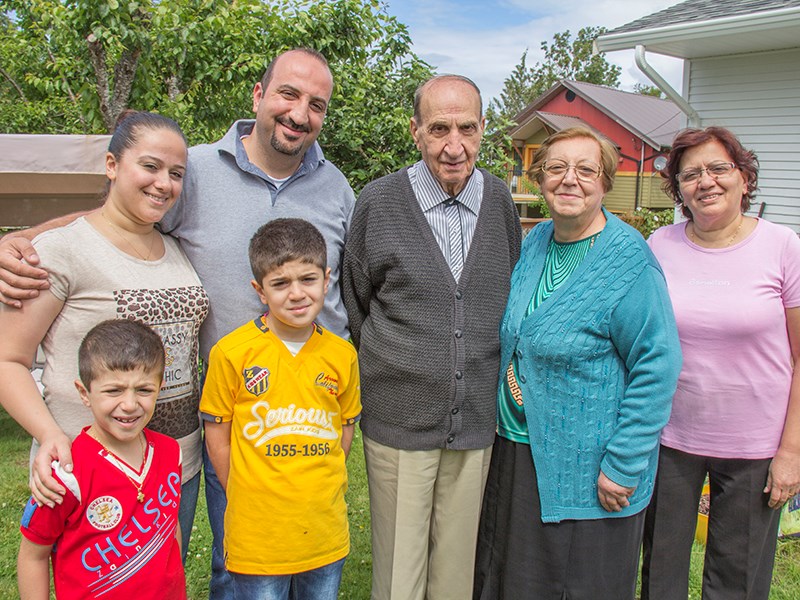The Azrak family had lived their entire lives in Halab, Syria. Then their lives were ripped from them and they became refugees of war. They now call Powell River home.
Refugees, no more.
“We are very excited about what’s ahead for us,” said Sharbel Azrak. “Very much so.”
Sharbel Azrak, his wife Kinda, and two boys, Sharbel, eight, and Aboud, five, arrived here on Wednesday, June 22, receiving a warm welcome as they came off the ferry at the Westview terminal.
Sharbel said it was a heart-wrenching decision for his family to have to leave the only home that they had ever known.
“It is more than difficult. It’s very hard to leave,” said Sharbel, speaking through interpreter Mary Josef, herself a refugee.
“I grew up in Halab,” said Sharbel. “It’s your only memories, where we grew up, and where you have all of your family and friends. Leaving is like comparing it with your soul leaving your body.”
Halab is an ancient city that is 12,000 years old. It is more commonly known by its present-day name, heard so often in reports from the Syrian conflict: Aleppo. The city has been at the centre of the Syrian war for the last four years where, according to Sharbel, most of the fighting in the war has been concentrated.
Sharbel was a small businessperson in Syria and his company made hummus and falafel. They were still doing business while the war was being fought around them. His business was robbed on several occasions by armed fighters.
“We feared for our lives. We were still working because we were selling in the market,” said Kinda. “We would leave to go to work, but we didn’t know if we would be back when the bombs came. We would go into the basement of our home to escape.”
Aleppo is where the so-called “mother of battles” has been fought between the government forces of Syrian president Bashar al-Assad, ISIS terrorists, militias and foreign-backed rebels. At the time of the Azraks’ escape two years ago, the government was in control of the city.
“The fighting was getting closer and closer,” said Sharbel. “There was an explosion just about 100 metres from our home.”
Sharbel said a bomb hit his father’s home. “There was a big explosion and my house was damaged,” said Aboud.
Sharbel, Kinda and the children left Syria on March 18, 2014. Aboud, his wife Mouna and Kinda’s mother Sonia followed.
“It was very hard to leave our home and our business,” said Kinda. “We were lucky to have clothes when we left. That is all that we left with, and our documents. We fled in a hurry.”
The Azraks’ journey first took them to Tartus, a port city on the Mediterranean coast which, at the time, was a bit safer than Halab. From Tartus, they had a difficult journey to Amman, the capital city of Jordan.
In Amman, people at a church in the neighbourhood where they were staying with friends said they should apply to come to Canada through the United Nations Refugee Agency that matches refugees with sponsors in Canada.
Then the waiting began. Kinda said the family did not know if they were going to make it through the screening process or not. The first thing they found was a sponsor. In their case, it was a joint sponsorship between Powell River’s Westview Baptist Church and Evangel Pentecostal Church.
After completing the necessary interviews and medical examinations, it took three months before learning they would be coming to Canada. The entire process took eight months.
“It was a long trip to Powell River,” said Sharbel. “It took 47 hours. We flew from Amman to Paris, Paris to Vancouver, then to the Comox airport and, of course, the ferry trip.”
Their long journey now over, Sharbel looks back on what he and his family left behind and what he has found.
“I feel like I am a human being,” he said. “Back home, it doesn’t feel that way. The human life is not respected. Back there, you didn’t know when you would be killed. It’s hard to express this, but when civil war happens, humans become like animals. There is no value in human life. The hater has a gun, ‘let’s kill them, they are nothing’. That’s how it is.”
Only a day and a half after their arrival in Powell River, Sharbel said his family feels like they are in paradise.
“How we are greeted here is an awesome thing,” he said. “How generous you are and how nice you are. That is what is very touching.”
As for going back to Syria to live, Sharbel said, “I would never think about it.”
If the situation did get better and the war ended, he said he would think about returning to take care of things, such as their houses, which they still own.
Other than that, Sharbel is of the same mind as his father.
“I am happy to be here,” said Aboud. “I don’t feel anything about not going back home. I don’t feel regret. There is nothing left there.”
The family are starting out with nothing in Powell River, but are now optimistic for their future.
“I started from nothing back home and I became a successful man, so I have no problem starting out again,” said Sharbel.
According to Sharbel, his thoughts and hopes are that his family members still in Syria are safe.
“We know that the Canadian government is helping lots,” said Sharbel. “I am asking the government to help them to be humans and get them out of there. They would love to leave Syria, but they can’t. This is my wish, to help others to get here.”



